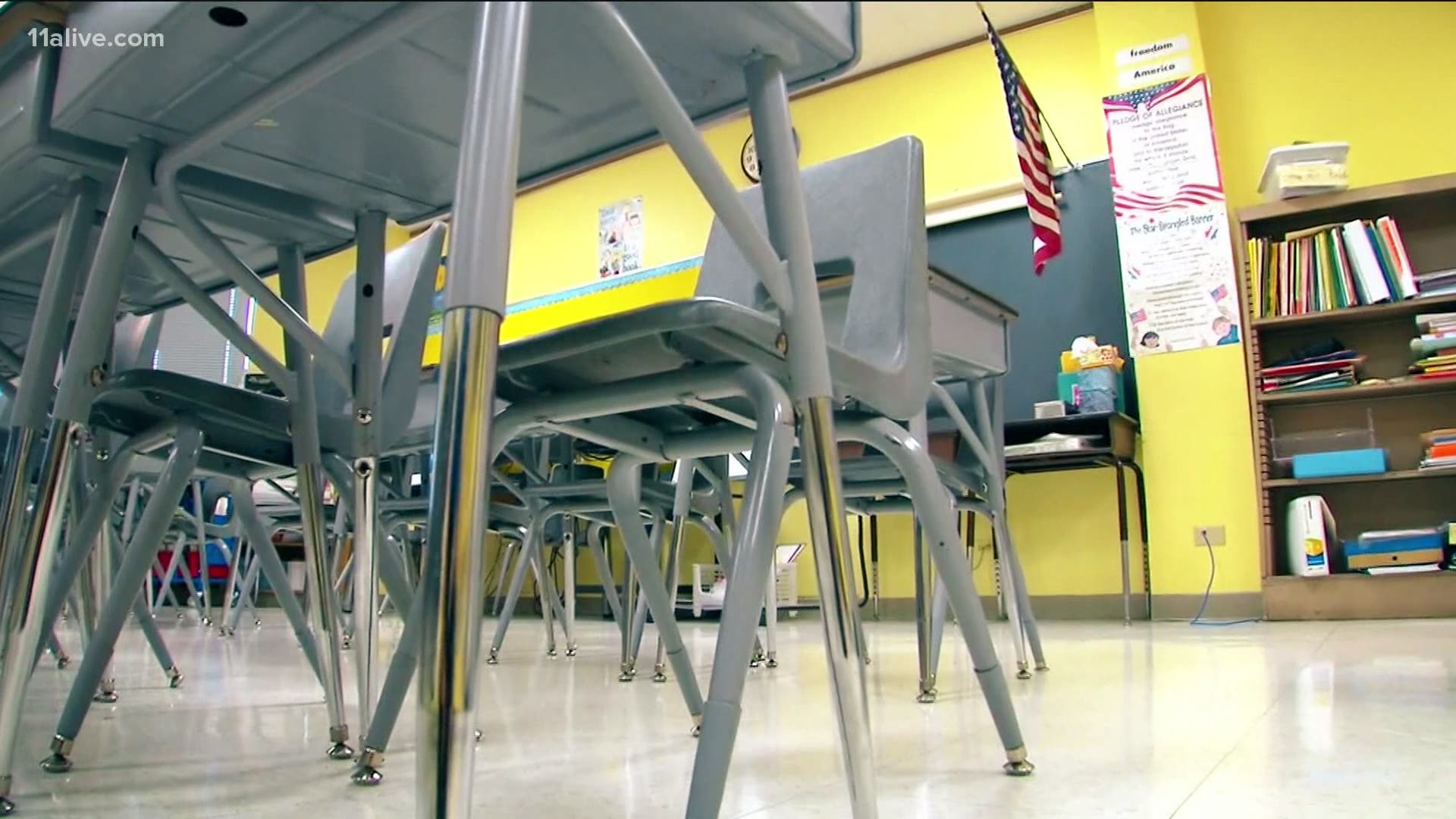MARIETTA, Ga. — Marietta City Schools made several changes to keep the COVID-19 virus in check after a study found teachers -- not students --were playing a central role in how the virus spread.
The study involved the Centers for Disease Control and Prevention partnering with Marietta City Schools and analyzing clusters of COVID-19 cases in its elementary schools during December and January.
"Our priority was really two-part," Marietta Superintendent Grant Rivera said of the study. "One, what can we learn about potential school-based transmission, and second as a result what are the additional safety protocols we can take to protect our students and staff."
During the study, Rivera said he walked through the district's schools in December and January along with CDC staff, disease investigators, pediatricians, and physicians.
Marietta, like other school districts, had already taken many preventative steps to control the spread of coronavirus, including mandatory mask-wearing.
Those walkthroughs though, along with the examination of nine clusters of COVID-19 cases in elementary schools, with eight involving probable teacher-to-student transmission, resulted in a list of changes.
"Once we know better we do better," Rivera said. "As part of this study, there were some big course corrections we made in very early January as we began to notice adult-to-adult potential school-based transmission."
The changes included teachers being told to remain home on Fridays. Prior to the CDC study, students were already learning remotely every Friday, but teachers were still going into the schools and at times working collaboratively in-person.
Staff is now instructed to hold all meetings virtually. Chairs have been removed from teacher workrooms, copy machines have been moved from small rooms to more open areas, and teachers are being told to eat lunch outside if they're eating along with other teachers.
"When an adult takes their mask down to eat a meal, potentially in a classroom that is a risk," Rivera said. "So we encouraged staff if they want to eat with their colleagues, be six feet apart and do it outside, otherwise avoid those types of close contacts, especially where masks might be off."
While Marietta schools already required masks to be worn inside schools, on school buses, and on outdoor school property when people aren't socially distanced, the CDC study found moments of inadequate mask-wearing likely added to the spread of COVID-19 in some of the clusters of cases.
"I believe the masks are consistently worn, however, we also acknowledge if and when for any reason they aren't, be it one child in an activity, or otherwise that creates a risk," Rivera said. "I believe the CDC appropriately acknowledged that."
Changes that will impact students, involved staff re-examining classrooms and looking for places to spread desks even further apart to promote distancing.
Classrooms that use small group learning are now being told to limit the groups to two or three students with those sessions only lasting up to 15 minutes, versus 30 minutes previously, and teachers should stand further back when instructing the group.
The CDC study also discussed the importance of adults in schools being vaccinated, since the study found transmission in most clusters began with an adult.
"This CDC report validates the importance of adults being vaccinated. If we can reduce adult and adult-to-student spread then we can make our classrooms safer," Rivera said. "As our governor and other leaders across this country work to improve supply I'm confident very soon, just as they want and I want we can get our educators vaccinated and our classrooms will be safer because of it."
Recently the district sent a survey to its 1,400 employees and 744 responded according to Rivera.
About 75 percent of employees that responded stated they want to receive the COVID-19 vaccine when available to them.
Thirteen percent aren't interested in receiving the vaccine. The remaining 12 percent of respondents were undecided.
"We've got to make sure that educators are making an informed decision regarding their health and providing them as much access to resources and experts as possible so they can do just that," Rivera said.
Recently the district held a virtual meeting for employees and involved staff from Cobb & Douglas Public Health.
The goal was to address any questions or hesitancies amongst school district employees. Questions included concerns people had about the vaccine and existing health issues they have, or questions people had because they're currently pregnant or have a desire to become pregnant.
"It is really about allowing our staff not to engage in one way conversations where we are throwing information at them, but really allowing them to engage in two way dialogue where we with experts can engage in question and answer and we get a much better sense of the pulse of our staff," Rivera said.
Such conversations will be on-going in Marietta City Schools, with Rivera adding he can't force any employee to get vaccinated when offered.
"I believe the decision to get a vaccine is an incredibly personal one and I want to respect that for all of our employees," he added.
However, superintendent hopes a large percentage of his staff will choose to be vaccinated. He stated the district will find the best ways to support any employees who decline the vaccine.

